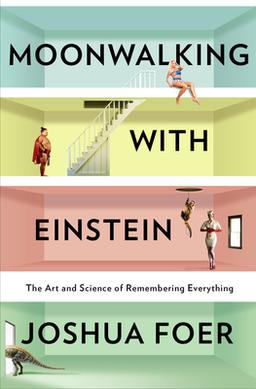Moonwalking with Einstein by Joshua Foer
Posted by Anonymous

Reviewed by: José Beltrán
What I Read: Moonwalking with Einstein: The Art and Science of Remembering Everything by Joshua Foer
Find It @YCLD: Here!
What It's About: Joshua Foer is a freelance science journalist who won the U.S. Memory Championship in 2006, then represented 300 million US citizens at the World Memory Championship. Foer won 13th place out of 37 world competitors. Most importantly for Foer, he joined the KL7 Club: the world’s most esteemed organization of mental athletes. He trained himself using the loci (Latin word for places) system of memorization using what he called memory palaces. The Loci system is attributed to Simonides of Ceos (c.560 B.C.) who is credited with turning words into mind pictures. To use this system, compress as much information as possible into a single well-formed image. Use your creativity to imagine the most ludicrous, most raunchy, most hilarious, most unforgettable images. Remember not word by word but rather topic by topic, picture by picture.
One of the techniques is to use the number n to stand for the number 2, then use a picture of a nun to remember the number 22. A quote worth quoting: “Regular practice simply isn’t enough. To improve, we must watch ourselves fail, and learn from our mistakes.” His most quotable quote was “Our memories make us who we are. They are the seat of our values and source of our character.” This book is so vital that its author was invited to give a TED (Technology, Entertainment and Design) talk on it. (It is available on youtube.com).
What I Thought: Use it or lose it! “The human brain is estimated to be able to store 108432 bits; there are only about 1078 atoms in the observable universe.” In Greek Mythology, Memory is the mother of the Muses. Without memory how could there be music, art, history, literature or science? How could there be us, our loved ones? Before writing the only way to record anything was through sheer memory. Poetry was created to help people remember through rhyme and meter. Writing was our next crutch, but look at all the irretrievable literature that has been lost. It is important to stop and smell the roses, but to truly live a memorable life we have to remember to remember smelling the roses.
We are nearing the crossroad, with all our electronic memory outsourcing we are forgetting how to remember. We are externalizing, outsourcing our memory. Why bother remembering? Just tap it into the computer, the phone, the tablet. Ray Kurzweil, one of the most respected advocates of the role of technology in our future, estimates the singularity point, the year 2045, is when mankind takes the next step in evolution into a part human, part machine.
Foer laments that people no longer invest in their memory. Our minds have incredible memory capacities. However, in spite of all the memory stunts and winning the US Memory Championship, Foer’s Working Memory was not improved. Josh not only forgot his keys, he forgot his car and even where he had parked it. If we do not pay attention, if we are not deeply engaged, fully mindful, we will not be able to recall where we put our keys. We are constantly bombarded with distractions. Our memory will only work when we remember to stop being on autopilot, notice, and pay attention. We are too distracted to remember to remember. Remember: “practice makes perfect.” To remember where you put your keys takes concentrated, self-conscious, deliberate will power and practice.
Readalikes: Your Memory: How It Works & How To Improve It by Kenneth L. Higbee, Ph.D.; The Memory Prescription by Gary Small, M.D.
Or look this book up on NoveList!
0 comments: